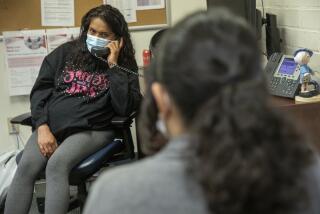County Prepares to Expand Freeway Call-Box System Eastward on I-8
Nearly 1,000 call boxes are operational on San Diego County freeways, ending the first phase of the $5.3-million emergency telephone system designed to aid stranded or endangered motorists, officials said Monday.
But, as the county moves into the second phase by adding 50 to 60 boxes along Interstate 8 from Japatul Valley to the Imperial County line, many of the phones remain inaccessible to wheelchair users. Those phones are situated where freeway shoulders are too narrow to accommodate vehicles equipped with wheelchair lifts.
Local and state officials will continue to study several solutions, including cutting through the curb-like berms or constructing small ramps next to the poles on which the phones are situated.
Cellular Phones
Another solution, county officials say, may be to provide disabled drivers with cellular phones that would have access only to the California Highway Patrol.
A special $1-a-year car registration fee in the county is used to fund the phone system. County Supervisor Leon Williams, chairman of the San Diego Service Authority for Freeway Emergencies, has suggested that the same fee or state or federal grants could be used to finance cellular phones for disabled drivers.
Meanwhile, SAFE members must determine whether to use a radio or cellular relay system to support the East County extension of the call boxes, which are put at half-mile intervals in urban areas and one-mile intervals in rural areas. There is no cellular coverage in the Phase 2 expansion area, said Granville Bowman, county director of public works and administrator of SAFE. The East County expansion is expected to begin before summer.
The third phase of the system includes narrowing the gaps between call boxes in key areas throughout the county as funds become available.
2,000 Calls a Week
CHP officials said about 2,000 calls a week are logged on the boxes. Most of the calls are from drivers of disabled automobiles, with cars that have run out of gasoline or overheated at the top of the list.
In a recent week, CHP dispatchers reported, they received 1,450 disabled-vehicle calls, 123 traffic-accident calls and 97 reports of hazards on the freeway.
Also, as many as 10% of the calls are from people who assume the call boxes can be used as ordinary pay phones.
“Too many calls are from people trying to answer their pager, asking directions or calling someone to tell them they’re late,” Bowman said.
More to Read
Sign up for Essential California
The most important California stories and recommendations in your inbox every morning.
You may occasionally receive promotional content from the Los Angeles Times.









